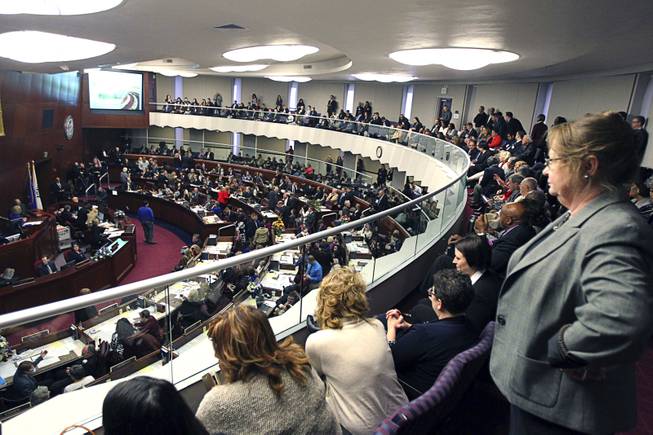
Lance Iversen / AP
Spectators look down on the Nevada Assembly on the opening day of the legislative session, Monday, Feb. 6, 2017 in Carson City.
Wednesday, Feb. 8, 2017 | 2 a.m.
Related news
When it comes to the 79th session of the Nevada Legislature, controversial issues will tend to get all the attention.
Topics that have been hotly debated on the national stage for decades, such the minimum wage and abortion, were on display Tuesday in the Senate. The Democratic majority introduced a bill to raise the minimum wage, and Republicans requested a bill mandating parental notification when pregnant minors undergo abortions.
The Assembly addressed voter registration on Tuesday, introducing a bill that would, among other things, automatically register voters when they received a driver’s license.
But legislation emanating from Carson City touches many areas of life, not just the ones that make state or national headlines.
Assembly Bill 113 would, among other things, require “certain employers to provide a reasonable time and place for an employee who is a nursing mother to express breast milk; prohibiting an employer from retaliating against an employee for certain actions relating to this requirement ...”
Airmen at Nellis Air Force Base could benefit from Senate Bill 33 that “prohibits the foreclosure of real property owned by certain military personnel or their dependents in certain circumstances.” Mortgage lenders need to pay attention to this one because the law provides criminal, not civil penalties.
Anyone planning to fake a traffic accident to claim the insurance money may want to delay their plans until the Legislature decides if it wants to pass Assembly Bill 15. Currently, faking an accident is a category D felony that earns the fraudster at least one year in jail and fines of up to $5,000. If this bill passes, the crime will be a category B felony that could garner con men and women from 2 to 10 years in jail and fines of $10,000.
Some bills, on first glance at least, seem heartfelt and worthy: Assembly Bill 1, for example, “requires the payment of certain undergraduate fees and expenses of the dependent child of a public employee who is killed in the performance of his or her duties.” Dependents of not just fallen public safety officers would qualify.
Other bills seem entirely more dry, like Assembly Bill 15, that “provides for the creation of certain local improvement districts.” Still, if it passes, local governments can more easily create improvement districts for energy efficiency or renewable energy projects. That could make the residents of those towns and cities happier — eventually.
Some of the proposed bills appear only to affect obscure parts of state government:
Senate Bill 43, revises the membership of the Nevada State Board on Geographic Names. If the bill passes, someone from the U.S. National Park Service will be a member of the board.
Senate Bill 38 revises provisions governing the state's central mailing room. This bill expands who can use the mailing room and will give local governments and other governmental entities access to its services. But they must pay for the services they use.

Join the Discussion:
Check this out for a full explanation of our conversion to the LiveFyre commenting system and instructions on how to sign up for an account.
Full comments policy